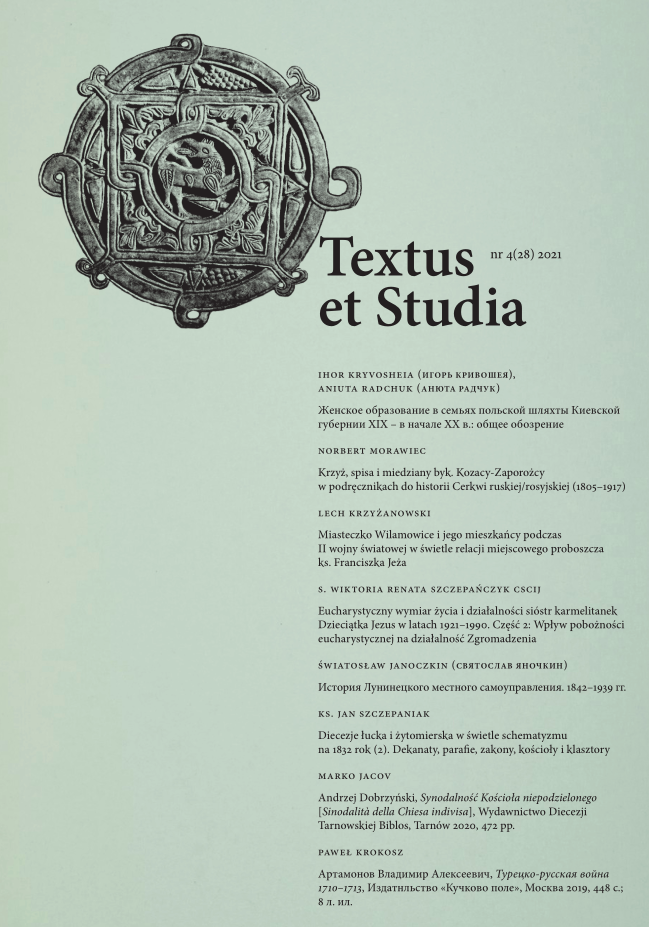Wilamowice and its inhabitants during World War II, in the light of the account of the local parish priest, Fr. Franciszek Jeż
DOI:
https://doi.org/10.15633/tes.07403Keywords:
nation, parish, parish priest, Volksliste, occupation, GermanyAbstract
The subject of the analysis was the written history of the local parish: Liber memorabilium Ecclesiae parochialis Willamowiciensis ab anno 1862, successively supplemented by successive parish priests from Wilamowice. Events of the Second World War were also described there. It was a special period in the history of the town and its inhabitants. Due to the fact that the inhabitants of Wilamowice did not use the Polish language on a daily basis, the invader considered these people to be Germans, suggesting that they should be placed on the Volkslist. It aroused reluctance on the part of Polish fellow residents and was tinder for more and more antagonism between the two groups. A witness of these events, the local parish priest, Fr. Franciszek Jeż described in detail the growing mutual animosities and the role of the German administration in escalating the conflict. The narrator did not try to convince himself of his neutrality. He clearly placed himself on the side of the Polish inhabitants, not hiding his indignation at the national attitudes of the Wilamowiceans. He accused them of betraying Polish interests turned into material benefits. In fact, the genesis of the problem was more complicated, nevertheless, many of his observations should be described as accurate and wellthought-out. The end of World War II did not eliminate the conflict. It entered a new phase of compensating for real and imagined wrongs by the Polish authorities. The totality of these complicated accounts was presented in an interesting way by Fr. Franciszek Jeż.
References
Archiwum Parafialne. Parafia Wilamowice, wizytacje dziekańskie ks. Józefa Rączki od 1920 do 1948 b.p.
Fic M., Krzyżanowski L., Meus K., Wilamowice 1818–2018. Miasto i ludzie, Wilamowice 2018.
Filip E., Flamandowie z Wilamowic? [stan badań], „Bielsko-Bialskie Studia Muzealne” 2005, t. IV, s.146–198.
Jacewicz W., Woś J., Martyrologium polskiego duchowieństwa rzymskokatolickiego pod okupacja hitlerowską 1939–1945, t. III, Warszawa 1978.
Kubis B., Poznawcze i kształcące walory literatury dokumentu osobistego (na przykładzie relacji Polaków wysiedlonych z Kresów Wschodnich oraz Niemców wysiedlonych ze Śląska w latach 1944–1946), Opole 2007.
Kuhn W., Die Wilmesauer Frauentracht, „Schlesische Blätter für Volkkunde” 1940, Bd. 4, s. 109–149.
Kula M., Nośniki pamięci historycznej, Warszawa 2002.
„Wilamowice i Okolice” 1992, nr 21.
Downloads
Published
Issue
Section
License
Copyright (c) 2022 Lech Krzyżanowski

This work is licensed under a Creative Commons Attribution-NonCommercial-NoDerivatives 3.0 Unported License.
Authors who publish with this journal agree to the following terms:
- Authors retain the copyright and full publishing rights without restrictions, and grant the journal right of first publication with the work simultaneously licensed under a Creative Commons Attribution 4.0 International License that allows others to share the work with an acknowledgement of the work's authorship and initial publication in this journal.
- Authors are able to enter into separate, additional contractual arrangements for the non-exclusive distribution of the journal's published version of the work (e.g., post it to an institutional repository or publish it in a book), with an acknowledgement of its initial publication in this journal.
- Authors are permitted and encouraged to post their work online (e.g., in institutional repositories or on their website) prior to and during the submission process, as it can lead to productive exchanges, as well as earlier and greater citation of published work (See The Effect of Open Access).

